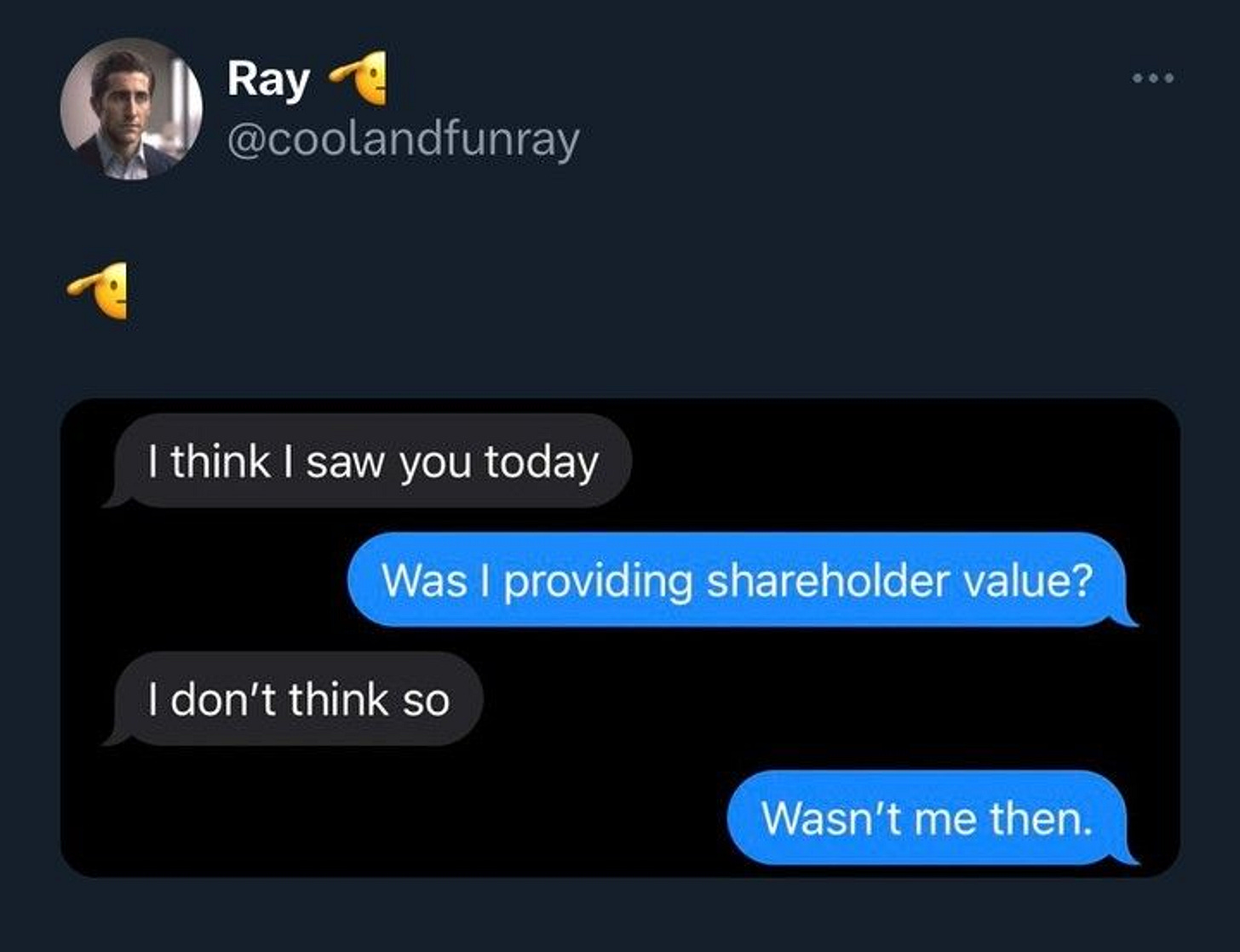June 2024 FP&A Roundup
The best FP&A content in June.
Read this post and join the discussion in Plan Buddies - the #1 community for FP&A professionals.
One Big Insight
My favorite quote with some added commentary from yours truly.
Jim Cook
From Sasha Orloff’s podcast, Turpentine Finance (emphasis added).
The reason I love being in finance, and I think a lot of people love being in finance, is we sit in the only seat that has the unique intersection of all the activities in the company. It's all captured in this thing called the general ledger or accounts payable. Like it's all in a database. We're the only ones that capture all that information. It's gold. So we have the ability to produce amazing insights from the only unique intersection of data in the whole company.
…How do you influence? How do you pull out just the nuggets and the kernels of all the insights and not get too detailed?
…Google's taught us keywords. Well, if that's true, start speaking in keyword language, start answering [stakeholders’] questions upfront and detail later.
…So speak their language, answer the questions that [they have], sit in their seat, not yours, and understand who your audience is and tailor your insights to them. If it's a board, there's a set of insights. If it's a CEO, it's a different set of questions that person usually has. And if it's your exec team, have a whole different set of information they want from you as a finance person.
“We have no idea what it costs to service a customer. We don’t even know if our products are priced accurately.”
This is what I was told day one at a new job. The business was performing exceptionally well and growing quickly. How could they not know if they were making money on their customers?
The answer is, no one ever looked at it. Engineering understood the technical cost to service a customer, but only looked through a lens of performance optimization and cost reduction. Sales and Marketing were laser focused on CAC and New ARR.
The fact is, only Finance is equipped to view the business holistically. We have the revenue data, the cost data, and the mandate to measure overall business performance.
It turned out, 2.5% of our customers were massively unprofitable. We could improve profitability by almost 5% by simply firing those customers — even better, these customers loved our product and were willing to pay more. A huge growth opportunity was uncovered by looking at profitability more granularly.
Sounds like a slam dunk for finance, right? Initially it wasn’t. When presenting my findings for the first time, I got way too detailed in the analysis. The analysis itself was simple (revenue - cost), but it required a deep understanding of every cost — many of which were technical in nature.
I learned that executives responded positively when I:
Invoked expert witnesses: “Engineering signed off on this methodology” or “Data QA’ed this query”
Quantified impact: “We’re losing $XM per month” instead of “2.5% of customers have a profit margin of -X%”)
Provided actionable recommendations: “If we limit this feature, we can drive upgrades from this subset of customers”
In my experience, Finance professionals spend 95% of their time on analysis and 5% on storytelling. But the numbers alone don’t drive change in an organization. When you make communication and storytelling as important as the analysis, the numbers inspire people to act.
Sound Bites
Great quotes with links to the original source.
Secret CFO
From his newsletter post, How to Fund Growth (and When Not To).
If there is one thing I’ve learned in my career above anything else, it’s this:
No one knows anything for sure. Everyone is winging it. The great executors aren't great because they know what’s going to happen.
They are great because they understand risk, monitor relentlessly, and react at the speed of light.
Philip Watson
From Paul Barnhurst’s podcast, FP&A Tomorrow (emphasis added).
Great FP&A looks like the ability to communicate with multiple stakeholders in all aspects of the business, and I think it looks like being very operational in both one's practicing and in one's outlook.
Kevin Kraus
From CJ Gustafson’s podcast, Run the Numbers (emphasis added).
[When a business partner comes to you with a problem]…you don't say if it's problem A, you go to that guy, if it's problem B, you go to that person over there…you got to keep things simple if you can.
And it does a couple things. It makes doing business internally easier…Most importantly, it helps develop a trusting and productive relationship between the functional leader and that finance person. And you can't underestimate the value of that.
…Ultimately what ends up happening in many, many cases it does, that finance person becomes an extended member of the functional team. They get invited to the staff meetings, they participate, and this can happen anywhere.
Scott Henderson
From Jack Sweeney’s podcast, CFO Thought Leader.
When sales knows rules, they can perform better. You get the right results.
Liran Edelist
Answering a question on using AI in forecasting from the Plan Buddies Event, Rolling Forecast Roundtable (emphasis added).
The first piece when we're talking about AI is the biggest question: what type of AI?
…There are many organizations that are using and have been using [predictive analytics for forecasting]
…Not as a full [forecasting exercise] but mostly for [recurring revenue], [estimating drivers such as] oil prices, or whatever. I worked with [a company] that used AI to predict their churn or renewal rates that was giving excellent results.
When I tested AI a couple of times it was fairly quick to get into 98 percent accuracy month over month, so [maybe not as useful] for a 12 month prediction, but with simple tools you can get nice accuracy for the next couple of quarters.
Thomas Ream
From CJ Gustafson’s podcast, Run the Numbers (emphasis added).
AI is really only valuable if it is a component of workflow. Otherwise, it's just an interesting thing.
Jason Hershman
From his LinkedIn post (emphasis added).
If you want to be a CFO but you’re not there yet – Here is what you should do.
Go find an FP&A role at startup, reporting directly to the CFO.
Why do I suggest this?
You’ll be the CFO’s right-hand person. You’ll be asked to figure out past results [and why they met expectations or didn’t]. You’ll be asked to explain the accounting [which will deepen your expertise]. You’ll be asked to manage board, and go fundraise [a critical part of the CFO’s job]. You’ll be asked to work with every department [on budgets, reviews, expectations]. You’ll need to setup systems and processes [within finance and within other departments].
There is just so much that will be asked of you. And doing it at a startup means you’ll have an impact.
And doing it as an FP&A person means you’ll see what a CFO needs.
Erica Gussert
From Jack Sweeney’s podcast, CFO Thought Leader.
Just trust your instincts….There's a reason that you that you've gotten where you have.
We're always wanting to be data driven, and we always want to make sure that we're using the best possible data set…that's in our blood.
But I think we also should realize that there are times when you have to use a combination of data and your gut. You have to use both in business. You have to move quickly.
Brett Hampson
From his newsletter article, 4 steps to level up in FP&A (emphasis added).
Often in finance we'll get an email like "I need a report to explain xyz". But what they really need is an email with a clear storyline that they can tell their boss about what's going on with xyz.
Ashley Johnson
From Jack Sweeney’s podcast, CFO Thought Leader (emphasis added).
I noticed a weird dynamic where [stakeholders] would go to the FP&A team and ask the question that I absolutely forbid now, which is: ‘What is my budget?’ or ‘Is this in my budget?’
That is not a question the FP&A team is allowed to answer. The FP&A team can say: ‘What do you want to spend on? And let's look at all the things that you're spending on and whether there's an opportunity for you to make trade-offs, to enable you to make this decision if it's a priority decision.’ But we do not answer the question: ‘Is it in my budget?’.
And we empower leaders across the organization to own their budget. We give them the tools, we give them check-ins once a month of how they are doing versus plan. Because I want them to be able to use the numbers and use the team to make decisions - not as a yes/no function.
I think too often, FP&A acts as the budget team.
Memes
One More Thing
I’d love your feedback on this newsletter. Send me a reply with your thoughts or answer this poll!




